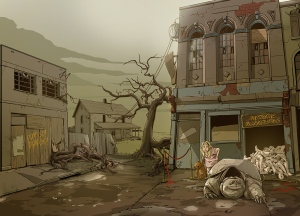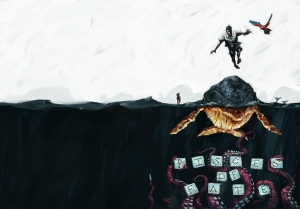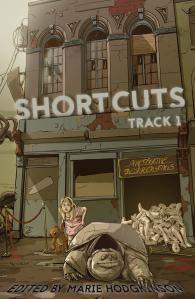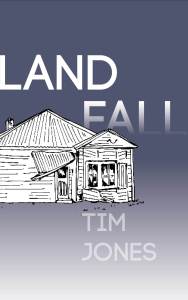Pirates! Adventure! Marine Science!
Pisces of Fate is the sequel to Paul Mannering’s award-winning Engines of Empathy. Join would-be oceanologist Ascott Pudding as his attempts to catalogue the flora and fauna of the Aardvark Archipelago are interrupted by a retired god, several varieties of pirate and a hunt for the oldest treasure of all … the Pisces of Fate.
In the warm tropical waters of the Aardvark Archipelago swims a fish that no one likes. The consensus is that the species, Deiectio Piscis, colloquially known as the ‘Poo Fish’, is a bit of a jerk. Inedible to humans and other predators, the Diarrhoea Fish has evolved explosive bowel evacuations as a defensive mechanism when threatened.
Ascott Pudding stopped typing and looked up, staring out from under the palm-leaf roof of his beach hut veranda. He gazed over the sunlit crystal waters of the lagoon, past the jagged fangs of the coral reef where the waves burst into foam, all the way to the horizon, where he saw the pale smudge of a man striding across the low waves.
‘This,’ he announced to the parrot that was drawing with crayons and paper on the table, ‘may require pants.’
‘Bithcuith,’ the parrot replied around the stub of Hibiscus Yellow clamped in its beak.
By the time Ascott had dressed in shorts and a loose shirt, and walked to the end of the small island’s narrow dock, the man was crossing the lagoon. Even at low tide, the water was two metres deep. As far as Ascott could tell, the man wasn’t walking on stilts, or wearing some kind of boat shoes. He was barefoot and walking across the pristine surface of the sea with the same casual stride of someone crossing a well-tended lawn.
‘Morning!’ Ascott called. The man raised a hand and shaded his eyes. From the dock, Ascott could see the walker was wearing the first pair of trousers he had seen in nearly two years. The man also wore a loose white shirt, a white hat and dark sunglasses. A pair of white sneakers hung around his neck by their laces and he clutched the handle of a small suitcase in his hand.
‘Ascott Pudding?’ the man said, looking up as he reached the water below the dock.
‘Yes?’
‘Son of Daedius and Krismiss, also known as Dorothy, Pudding?’
‘The very same.’ Ascott stepped back as the man climbed on to the dock and set his suitcase down.
‘And you are?’ Ascott said as the slender man removed his sunglasses.
‘You have a sister named Charlotte?’ the man asked, ignoring the earlier question.
‘I have a sister named Charlotte, yes. Look, what is this all—? AARRGH!’ Ascott fell back on the dock, blood streaming from his nose.
The man put his sunglasses back on and said, ‘I’ve travelled a long way to punch a member of the Pudding family in the face. Now that chore is over, how about a cup of tea, hmm?’ He picked up his suitcase and walked away towards the small house above the beach.
*
The tea tasted of blood, which Ascott assumed was because he couldn’t smell anything through his bruised nose. He pressed a damp cloth against his face and regarded the man sitting across from him. The stranger had introduced himself as Vole Drakeforth and, when he wasn’t punching strangers in the face, he looked almost civilised, like a crocodile in a business suit. Inside the clothes he seemed tall and thin, with dark hair and skin that looked as manicured as his nails. His eyes were a piercing blue and he wore an expression of mild contempt that seemed habitual.
‘So … you’re a god?’ Ascott said eventually.
‘I’m a retired god. I’m Arthur, the founder of Arthurianism.’
‘I thought you said your name was Vole Drakeforth?’
‘It is Vole Drakeforth. I also happen to be Arthur.’
‘Aren’t you supposed to have a beard or something?’
‘The problem with religion,’ Drakeforth said, ‘is that everything becomes codified.’
‘Which is why you don’t have a beard?’
‘Which is why I’m retired.’
‘You’ve retired to a small island in the Aardvark Archipelago?’ Ascott blinked. The island was small enough without sharing it with anyone else.
‘No, this is just a place I wanted to visit, specifically to punch you in the face.’
‘Oh, right.’ Ascott dabbed his tender nose. ‘It hardly seems fair to punch me in the nose because you’re angry with an ancestor of mine.’
‘Well, I am having an entirely different encounter with your sister,’ Drakeforth explained.
‘Please, don’t try to explain the quantum nature of perception to me again. It makes my head ache worse than my nose.’
Drakeforth ignored the request. ‘Simply put, at a quantum level, everything is taking place at the same time. While I am here, drinking tea with you, I am also drinking tea with your sister, Charlotte.’
Ascott groaned and sipped the blood-flavoured tea.
Drakeforth watched Charlotte’s younger brother wince. There was a definite family resemblance. They both had hair that black-brown shade of the possibly still edible bits of burnt toast. He decided to delay the bad news for a moment longer.
‘What do you actually do here?’ Drakeforth said, looking around at the bamboo-walled hut.
‘I sleep with fish,’ Ascott said.
‘Why?’
‘Pardon?’
Drakeforth spoke with exaggerated slowness. ‘Why do you sleep with fish?’
‘Because to truly know a fish, you have to interact with them completely. Swim where they swim, eat what they eat, sleep when they sleep. The more we know about the natural world around us, the more we can know about ourselves and our place in the Universe.’
‘What if I told you that fish exist only to make more fish. The only reason they are so dedicated to making more fish is that bigger fish eat them all the time. There’s your parallel to humanity’s place in the natural order of things right there,’ Drakeforth said.
‘I’ve seen species do things that no one has ever observed before. I’ve learned about their mating habits, their life cycles, the way they protect themselves from predators. I’m sure that they know more than they’re letting on.’
Drakeforth stared at the thin, slightly unkempt young man who had Charlotte Pudding’s eyes and a swollen nose. ‘Have you told anyone else about these ideas of yours?’
‘Not yet. I’m writing a book on it. A study of the fish species of the Aardvark Archipelago.’
‘Good for you. I suppose you survive on a diet of fresh fish and milknuts?’
Ascott blushed slightly. ‘I don’t eat that much fish. There’s a girl, Shoal, who comes from Montaban every couple of weeks with frozen pizzas.’
The parrot flew up and landed on the table, where it tested the strength of one of the tea mugs by biting it.
‘Get off the table, Tacus.’ Ascott waved his hand ineffectually at the bird.
‘Bithcuith,’ the parrot said.
‘Your bird appears to have a speech impediment,’ Drakeforth observed.
‘Nobody’th perfect!’
‘Tacus, this is Vole Drakeforth. Say hello to the nice man.’
Tacus hopped from foot to foot and kept his beak shut.
‘He is an excellent judge of character,’ Drakeforth said.
‘Are you hungry? I can heat up a pizza?’
‘Bithcuith!’ Tacus squawked.
‘Not necessary; the tea is quite sufficient,’ Drakeforth said.
‘I really did see you walking across the ocean?’
‘Hardly,’ Drakeforth said with a snort. ‘I flew into Montaban, then I got directions from some fishermen, then I hired a small boat, which—’
‘I’m sure I saw you walking on water,’ Ascott said.
‘—Which sank. From there I walked.’
‘From Montaban? That’s twenty miles.’
‘From some point between here and Montaban, it was far less than twenty miles.’
‘That’s still quite an achievement,’ Ascott said.
‘It is possible that instead of walking I could have simply materialised on your doorstep and punched you in the face. However, doing that would have been far too easy and it’s nice to appreciate something that you have actually worked for. Besides, it was a nice day for a stroll.’
‘Now that you bring it up,’ Ascott said thickly. ‘This may be a silly question, with an obvious answer, but why in the Hibiscus did you come all this way to punch me in the face?’
‘You’ve been here since your parents died?’ Drakeforth asked.
‘Pretty much. I ran away after their funeral.’
‘Leaving Charlotte to take care of things?’ Drakeforth made the accusation sound like a throwaway remark.
‘She is good at taking care of things.’
‘Yes – if the manuscript she hasn’t written yet is to be believed, she will soon be taking care of your great-grandfather.’
‘What?’
‘You haven’t been paying attention.’ Drakeforth nodded.
‘I have, but mostly to the fish,’ Ascott said.
‘Your sister, Charlotte, is dying. She is also presently uncovering a grave conspiracy to enslave the world and discovering the truth about many things, including the true source of empathic energy.’
Ascott’s mind reeled with cold shock. ‘Charlotte always has been good at multi-tasking,’ he managed.
‘So I am seeing,’ Drakeforth agreed.
‘Charlotte … is dying? I need to go home.’ Ascott stood up and turned in a complete circle while trying to decide what to do next. He didn’t have anything to pack other than the elderly typewriter and hundreds of pages of notes, drawings and manuscript.
When he turned back around, Drakeforth was gone.
‘Bithcuith!’ Tacus squawked.




